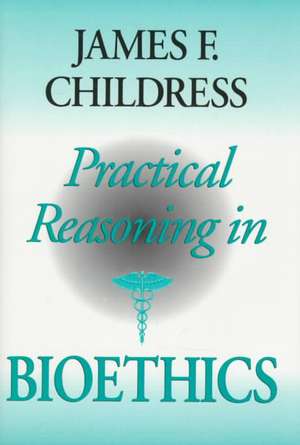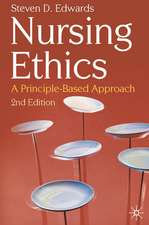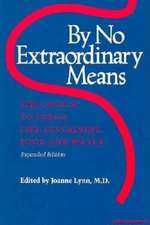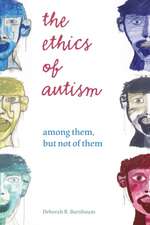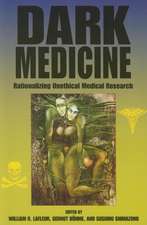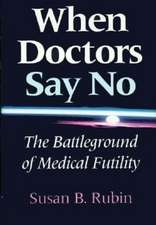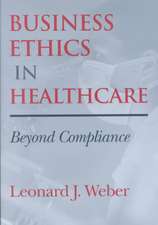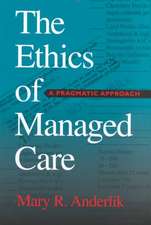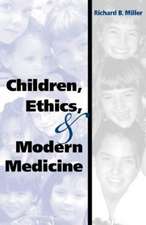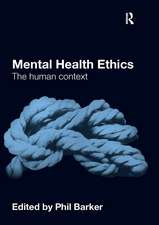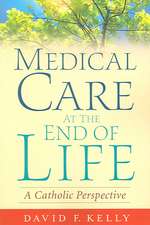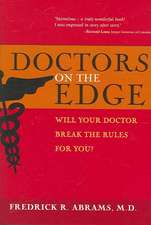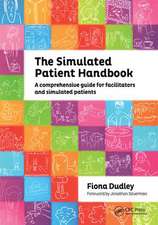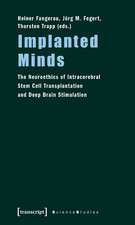Practical Reasoning in Bioethics
Autor James F Childressen Limba Engleză Hardback – 21 mar 1997
Preț: 519.54 lei
Nou
Puncte Express: 779
Preț estimativ în valută:
99.42€ • 103.17$ • 83.10£
99.42€ • 103.17$ • 83.10£
Carte tipărită la comandă
Livrare economică 17-31 martie
Preluare comenzi: 021 569.72.76
Specificații
ISBN-13: 9780253332189
ISBN-10: 0253332184
Pagini: 400
Dimensiuni: 160 x 236 x 29 mm
Greutate: 0.83 kg
Editura: MH – Indiana University Press
ISBN-10: 0253332184
Pagini: 400
Dimensiuni: 160 x 236 x 29 mm
Greutate: 0.83 kg
Editura: MH – Indiana University Press
Cuprins
Preface
Acknowledgments
Part One: Principles, Metaphors, and Analogies
1. Metaphor and Analogy in Bioethics
2. Ethical Theories, Principles, and Casuistry in Bioethics: An Interpretation and Defense of Principlism
3. Metaphors and Models of Doctor-Patient Relationships: Their Implications for Autonomy with Mark Siegler
Part Two: Respect for Autonomy: Its Implications and Limitations
4. If You Let Them, TheyÕd Stay in Bed All Morning: The Principle of Respect for Autonomy and the Tyranny of Regulation in Nursing Home Life
5. How Much Should the Cancer Patient Know and Decide? with Bettina Schoene-Seifert
6. Mandatory HIV Screening and Testing
Part Three: Termination of Life-Sustaining Treatment
7. ÒWho Is a Doctor to Decide Whether a Person Lives or Dies?Ó: Reflections on DaxÕs Case with Courtney S. Campbell
8. Must Patients Always Be Given Food and Water? with Joanne Lynn
9. When Is It Morally Justifiable to Discontinue Medical Nutrition and Hydration?
Part Four: Allocation of Health Care
10. Who Shall Live When Not All Can Live?
11. Triage in Intensive Care: The Possibilities and Limitations of a Metaphor
12. Fairness in the Allocation and Delivery of Health Care: A Case Study of Organ Transplantation
13. Rights to Health Care in a Democratic Society
Part Five: Obtaining Organs and Tissues for Transplantation
14. Ethical Criteria for Policies to Obtain Organs for Transplantation
15. Human Body Parts as Property: An Assessment of Ownership, Sales, and Financial Incentives
16. Ethics, Public Policy, and Human Fetal Tissue Transplantation
Research
Notes
Index
Acknowledgments
Part One: Principles, Metaphors, and Analogies
1. Metaphor and Analogy in Bioethics
2. Ethical Theories, Principles, and Casuistry in Bioethics: An Interpretation and Defense of Principlism
3. Metaphors and Models of Doctor-Patient Relationships: Their Implications for Autonomy with Mark Siegler
Part Two: Respect for Autonomy: Its Implications and Limitations
4. If You Let Them, TheyÕd Stay in Bed All Morning: The Principle of Respect for Autonomy and the Tyranny of Regulation in Nursing Home Life
5. How Much Should the Cancer Patient Know and Decide? with Bettina Schoene-Seifert
6. Mandatory HIV Screening and Testing
Part Three: Termination of Life-Sustaining Treatment
7. ÒWho Is a Doctor to Decide Whether a Person Lives or Dies?Ó: Reflections on DaxÕs Case with Courtney S. Campbell
8. Must Patients Always Be Given Food and Water? with Joanne Lynn
9. When Is It Morally Justifiable to Discontinue Medical Nutrition and Hydration?
Part Four: Allocation of Health Care
10. Who Shall Live When Not All Can Live?
11. Triage in Intensive Care: The Possibilities and Limitations of a Metaphor
12. Fairness in the Allocation and Delivery of Health Care: A Case Study of Organ Transplantation
13. Rights to Health Care in a Democratic Society
Part Five: Obtaining Organs and Tissues for Transplantation
14. Ethical Criteria for Policies to Obtain Organs for Transplantation
15. Human Body Parts as Property: An Assessment of Ownership, Sales, and Financial Incentives
16. Ethics, Public Policy, and Human Fetal Tissue Transplantation
Research
Notes
Index
Recenzii
"This is a valuable clarification, re-statement and defence of principlism as an approach to applied ethics. It is strongly recommended to many teachers of bioethics . . ." - Journal of the American Medical Association "Childress' book deserves careful study by all concerned with the ethical aspect of contemporary biomedical challenges." - Science Books & Films
"An ideal supplement for a graduate seminar on bioethics or for upper-division undergraduates needing more information in this area." - Choice
"This is a valuable clarification, re-statement and defence of principlism as an approach to applied ethics. It is strongly recommended to many teachers of bioethics ..." - Journal of the American Medical Association "Childress' book deserves careful study by all concerned with the ethical aspect of contemporary biomedical challenges." - Science Books & Films "An ideal supplement for a graduate seminar on bioethics or for upper-division undergraduates needing more information in this area." - Choice
"An ideal supplement for a graduate seminar on bioethics or for upper-division undergraduates needing more information in this area." - Choice
"This is a valuable clarification, re-statement and defence of principlism as an approach to applied ethics. It is strongly recommended to many teachers of bioethics ..." - Journal of the American Medical Association "Childress' book deserves careful study by all concerned with the ethical aspect of contemporary biomedical challenges." - Science Books & Films "An ideal supplement for a graduate seminar on bioethics or for upper-division undergraduates needing more information in this area." - Choice
Notă biografică
James F. Childress is the Edwin B. Kyle Professor of Religious Studies and Professor of Medical Education at the University of Virginia, where he also co-directs the Virginia Health Policy Center. He is the author of over a hundred articles, many of them in biomedical ethics; his several books include Principles of Biomedical Ethics (with Tom L. Beauchamp), Who Should Decide? Paternalism in Health Care, and Priorities in Biomedical Ethics.
Textul de pe ultima copertă
In his latest book, renowned ethicist James F. Childress uses various metaphors and analogies to highlight the role of imagination in practical reasoning. Childress shows how principles, metaphors, and analogies illuminate moral problems and issues in science, medicine, and health care. The issues he considers include screening and testing for HIV infection, informed consent to and refusal of life-sustaining treatment, allocating scarce health care resources, providing access to and controlling the costs of health care, and obtaining organs and tissues for transplantation.
Descriere
A renowned ethicist explores problem areas in biomedical ethics and shows how principles, metaphors, and analogies interact in practical reasoning.
